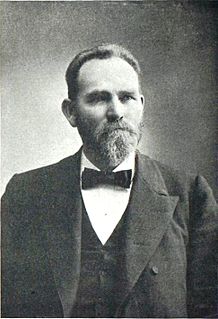A Quote by Marcel Proust
We were resigned to suffering, thinking that we loved outside ourselves, and we perceive that our love is a function of our sorrow, that our love perhaps is our sorrow.
Related Quotes
We mourn; we sorrow for our loved ones that go - our wives, our husbands, our children, our parents; we sorrow for them; and it is well and proper that we should moum for them and shed tears for the loss, for it is our loss; but it is their gain, for it is in the march of progress, advancement and development. It will be all right when our time comes, when we have finished our work and accomplished what the Lord required of us.
Another misconception is that if we truly loved someone, we will never finish with our grief, as if continued sorrow is a testimonial to our love. But true love does not need grief to support its truth. Love can last in a healthy and meaningful way, once our grief is dispelled. We can honor our dead more by the quality of our continued living than by our constantly remembering the past.
It is abundantly evident that, however natural it may be for us to feel sorrow at the death of our relatives, that sorrow is an error and an evil, and we ought to overcome it. There is no need to sorrow for them, for they have passed into a far wider and happier life. If we sorrow for our own fancied separation from them, we are in the first place weeping over an illusion, for in truth they are not separated from us; and secondly, we are acting selfishly, because we are thinking more of our own apparent loss than of their great and real gain.
Friends given by God in mercy and in love;
My counsellors, my comforters, and guides;
My joy in grief, my second bliss in joy;
Companions of my young desires; in doubt
My oracles; my wings in high pursuit.
Oh! I remember, and will ne'er forget
Our meeting spots, our chosen sacred hours;
Our burning words, that utter'd all the soul,
Our faces beaming with unearthly love;--
Sorrow with sorrow sighing, hope with hope
Exulting, heart embracing heart entire.
Being human, we would expel from our lives physical pain and mental anguish and assure ourselves of continual ease and comfort, but if we were to close the doors upon sorrow and distress, we might be excluding our greatest friends and benefactors. Suffering can make saints of people as they learn patience, long-suffering, and self-mastery.
The greatest barrier to own own healing is not the pain, sorrow or violence inflicted upon us as children. Our greatest hindrance is our ongoing capacity to judge, to criticize, and to bring tremendous harm to ourselves. If we can harden our heart against ourselves and meet our most tender feelings with anger and condemnation, we simultaneously armor our heart against the possibility of gentleness, love and healing.
We believe we are hurt when we don't receive love. But that is not what hurts us. Our pain comes when we do not give love. We were born to love. You might say that we are divinely created love machines. We function most powerfully when we are giving love. The world has led us to believe that our wellbeing is dependent on other people loving us. But this is kind of upside down thinking that has caused so many of our problems. The truth is our well being is dependent on our giving love. It is not about what comes back; it is about what goes out!
Today, when we look at a brain, we see an intricate network of billions of neurons in constant, crackling communication, a chemical labyrinth that senses the world outside and within, produces love and sorrow, keeps our hearts beating and lungs breathing, composes our thoughts, and constructs our consciousness.
A friend of mine said to me not long ago, "Terry you are married to sorrow." I looked at him and said, "No, I am not married to sorrow, I just choose not to look away." To not avert our eyes to suffering is to trust the power of presence. Joy emerges through suffering. Suffering is a component of joy. Whether we are sitting with a loved one dying or witnessing dolphins side-by-side watching the oil burning in the Gulf of Mexico, to be present with the world is to be alive. I think of Rilke once again, "Beauty is the beginning of terror." We can breathe our way toward courage.
Recently, one friend asked me, "How can I force myself to smile when I am filled with sorrow? It isn't natural." I told her she must be able to smile to her sorrow, because we are more than our sorrow. A human being is like a television set with millions of channels. If we turn the Buddha on, we are the Buddha. If we turn sorrow on then we are sorrow. If we turn a smile on, we really are the smile. We can not let just one channel dominate us. We have the seed of everything in us, and we have to seize the situation in our hand, to recover our own sovereignty.
Suffering invites us to place our hurts in larger hands. In Christ we see God suffering – for us. And calling us to share in God’s suffering love for a hurting world. The small and even overpowering pains of our lives are intimately connected with the greater pains of Christ. Our daily sorrows are anchored in a greater sorrow and therefore a larger hope.






































